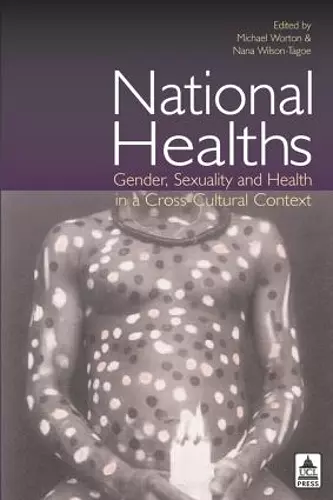National Healths
Gender, Sexuality and Health in a Cross-Cultural Context
Michael Worton editor Wilson Tagoe editor
Format:Paperback
Publisher:Taylor & Francis Ltd
Published:10th Sep '04
Currently unavailable, and unfortunately no date known when it will be back
This paperback is available in another edition too:
- Hardback£145.00(9781138166929)

In today's globalised world, it is increasingly important to understand the otherness of different societies and their beliefs, histories and practices. This book focuses on a burning cultural issue: how concepts and constructions of gender and sexuality impact upon health, medicine and healthcare. Starting from the premise that health is neither a universal nor a unitary concept, it offers a series of interdisciplinary analyses of what sickness and well-being have been, are and can be.
The originality of this book is its cross-cultural and trans-historical approach. Bringing together specially commissioned work by both major critical voices and young scholars in fields ranging from anthropology and art history to philosophy, political science and sociology, this volume challenges many traditional assumptions about gender, medicine and health-care. Issues addressed include: the politics and realities of female genital mutilation; sex-work and migration; the portrayal of mothering in contemporary African writing; the representation of AIDS in literature, photography and the media; the place of gender in ancient Egyptian health papyri; the dramatisation of morality and sexual over-indulgence in Thai literature; the relationship between myths of menstruation and power in early modern England; the role of anger in traditional Chinese medicine; and the ways in which both disease and sexual identities were redefined by cholera in the nineteenth century.
The wide-ranging Introduction provides a historical and theoretical framework for what is defined here as Cultural Medicine, whilst fifteen original essays demonstrate from different perspectives that health is not merely a physiological and medical issue, but also a cultural and ethical one.
An invaluable research and study resource, this book is written in a clear and accessible style and will be of interest to the general reader as well as to students of all levels, to teachers of a wide range of disciplines, and to specialist researchers of cultural studies and of medicine.
How do construction so sexuality and gender travel? And how are sexuality and gender mediated by, and contingent on, conditions of health and illness? This volume sets out to address these questions through a compilation of essays grounded in diverse cultural contexts and disciplinary formats. In this wide-ranging collection, the reader can engage with a number of bundles of related critical issues. Many of the essays highlight the role of the nation and, in particular, the role of national identity in creating conditions in which health and illness are experienced and perpetuated. Two essays that illustrate particularly well how dislocation, exile and mobility between nations affect the health profiles of specific populations are Audrey Prost's "Infectious social change: Tuberculosis and exile among Tibetan Refugees in Dharamsala" and James Agar's "Remembrance of health lost: Disfiguring Africa in European Aids writing". Another group of essays highlights the fundamental instability of the concept of health through analyses of the politic of its representation. In particular, Margaret Healy's "Dangerous blood: Menstruation, medicine and myth in early modern England" and Lynda Morgan's "Vulnerable margins: The iconography of blood, dirt and disease in the early 20th Century South African settler novel" show how the iconography of illness is open to regular and forceful contestation. Taken together, this bundle of work contends not only that the meaning of illness is always contingent on other cultural and social forms, but also that the very materiality of illness can in not way be taken for granted as a baseline for understanding either health or illness. Finally, a highly provocative bundle of essays addresses the practical implications of and limitations to understanding health as a primarily cultural phenomenon. In "Female genital mutilation: Contesting the right to speak of women's bodies in Africa and the West", Nahid Toubia argues that while health is embedded within a cultural context, understanding the health experience of various groups cannot be reduced to seeing health as merely a function of their cultural condition. Readers are thus given the tools that will help them to deconstruct the nation, nationality and location of health and illness, as well as to interrogate the implications of location - in its multiple senses of epistemology, geography and culture... The individual essays in the volume will be of interest to medical sociologists, medical anthropologists and those interested in the cultural studies of health and illness. Historians of medicine and literary critics will also find some essays of interest. Sarah Hodges, Times Higher Educational Supplement, 5 August 2005.
ISBN: 9781844720170
Dimensions: unknown
Weight: 470g
252 pages